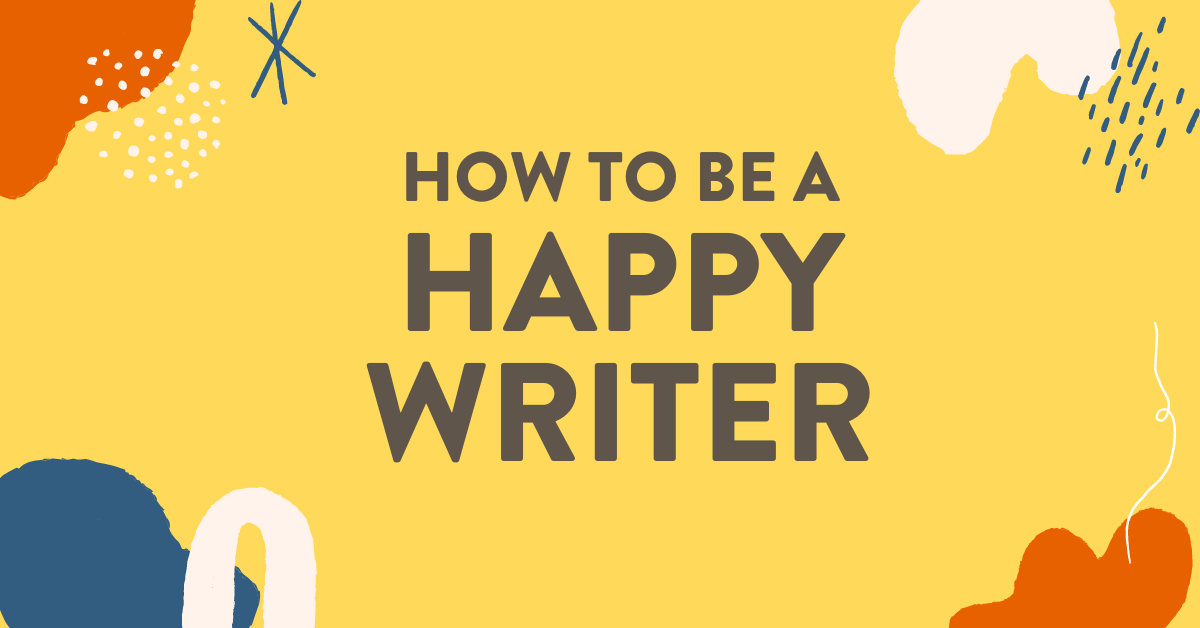 It’s true that people write the advice they need to hear, and I’ll be the first to admit I haven’t been the perfect model for a happy writer.
It’s true that people write the advice they need to hear, and I’ll be the first to admit I haven’t been the perfect model for a happy writer.
I had some bad years. Mrs. Bookfox definitely saw the worst of it. Part of it was chemical issues, but also I had such extravagant fantasies about writing success and none of them were coming true.
And I’m not an outlier — in the writing groups I’ve been a part of, and the writers I’ve known, many have struggled with either sadness or depression.
For me, I’ve worked on both the physical side and the attitude side in the last five years, and I’m happy to say I’m in a much happier place now.
If you’re struggling with the attitude side, this post should help you. In some ways you can jury-rig your happiness — if you do the type of things that reliably bring happiness. Let’s call it the social science of happiness.
Below are actual techniques I’ve used over the years in my writing life, and looking back, in those times I’ve been really satisfied, at peace, and happy with my writing.
1. Reread the Book that Made You Want to Become a Writer
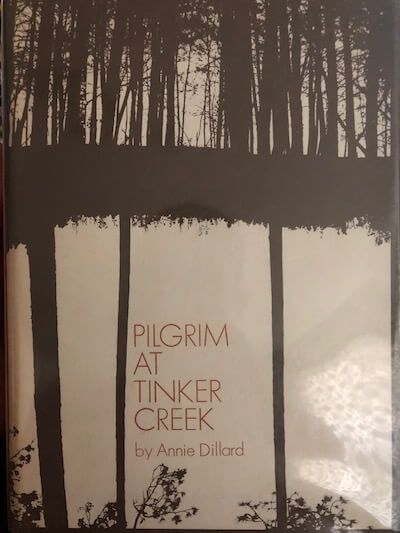
I first knew I wanted to become a writer when I read Annie Dillard’s “Pilgrim at Tinker Creek.”
The lush language, her philosophy of living, the careful observation of the natural world — it was the most beautiful book I’d ever read, and all I wanted to do was to join her project of transforming words into emotion.
Sometimes you have to go back to the origin. To remember why you write at all. We need those reminders.
Every few years, I’ll crack open Dillard’s book again and remind myself of why writing is valuable, and remember how it feels to experience epiphany after epiphany. My entire spirit is uplifted in those moments, and I feel that rush of energy necessary for good writing.
2. Do Some Guerrilla Poetry
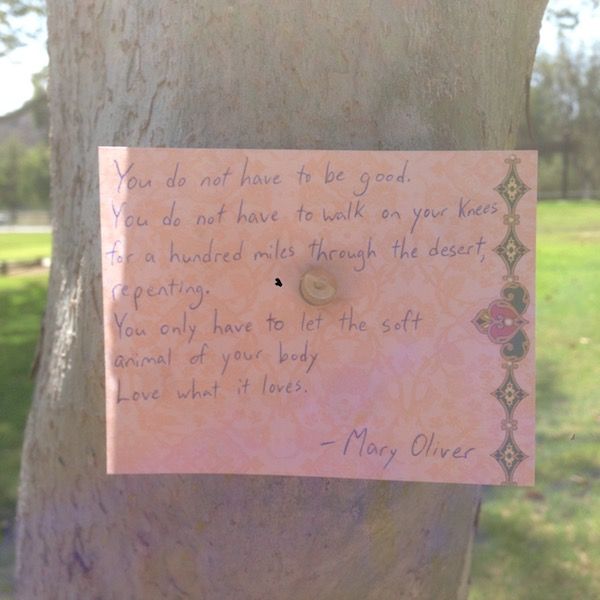
I am not a poet, but I love poetry.
So I used to handwrite excerpts from famous poems and post them in public places, usually parks.
Then I’d wait, watching my twins as they played on the playground, until visitors came by and read it.
I loved watching their surprise as they realized it wasn’t another flier, another governmental notice, another yard sale advertisement, and instead a mosaic of artfully arranged words.
I dare you to do this without smiling. Seriously, it brings joy.
It’s like a happiness hack. Spread the words, writers!
I’m posting an example of a poem by Mary Oliver that I’ve posted. It’s not even a particularly happy poem, but that doesn’t matter! The joy comes from ambushing people with art when they least expected it.
3. Schedule a Praise Session
 Writers receive an enormous amount of criticism. You’re probably part of a writing group and when you give your material to them, you get to listen to an hour of criticism. Which is wonderful and necessary. But sometimes, it’d be nice to listen to kind words.
Writers receive an enormous amount of criticism. You’re probably part of a writing group and when you give your material to them, you get to listen to an hour of criticism. Which is wonderful and necessary. But sometimes, it’d be nice to listen to kind words.
Where can you find such kind words? It’s like hunting a mythical beast.
I would recommend a praise session. Call up your writing bestie and exchange a new piece of writing with them. A small piece. And then meet up over drinks and spend 15 minutes extolling all the virtues of each other’s writing.
“You are hilarious! I snorted 6 and a half times while reading this! And your characterization of the protagonist was O’Connor-level genius. You always write such fantastic first lines! Gurrrlllll, you gotz mad skillz!”
No critiques. There is always enough of that. Just for this one time, just praise.
Give a little love, get a little love. We writers need some love.
4. Throw a Party for Someone Else
 Got a friend with a book coming out? Throw them a party! Put up some red streamers, bake some bacon-wrapped dates, and invite all your writing friends and enemies.
Got a friend with a book coming out? Throw them a party! Put up some red streamers, bake some bacon-wrapped dates, and invite all your writing friends and enemies.
Your friend can answer questions, much alcohol will be drunk, and some books will be bought.
Plus, your friend will love you forever. It gets tiring doing all the promotion when a book comes out, and if you can take over a bit of that responsibility for them, it will fill their heart with joy. And that joy will spill over and fill your heart with joy.
5. Have a Mission Bigger than Yourself
Ultimately, if you spend all your time chasing your own goals as a writer, you’ll come up feeling empty. You have to align your personal writing with some larger project.
That means not only writing short stories and publishing them, but also championing the form of short stories and joining communities of short story writers.
That means not only creating your own writing community, but thinking about how to help others create their own writing community.
If you’re a spiritual person like I am, then you might want to connect your writing with a larger goal of helping people with your writing, or convincing people of a larger truth about life, or even of honoring God by creating beauty.
6. Volunteer!
 The secret to happiness is always giving of yourself. How have you shared your writing talents with others?
The secret to happiness is always giving of yourself. How have you shared your writing talents with others?
You can volunteer to read to retirees at an old folks home. Not one of your own pieces (you don’t need that pressure!). Read some poetry you like, or a funny passage from David Sedaris.
Or volunteer at an 826 center, teaching elementary school kids how to write a story. By donating your time and attention to the next generation, you’ll be injecting your life with some meaning and perspective.
You can also donate actual money to an organization like PEN International, which helps oppressed writers around the world, even helping them get out of their country of origin if they need to go into exile.
7. Work Steadily
 When you’re working steadily on a project, life is all roses and daisies. Some of my greatest stretches of happiness as a writer is when I’m deeply immersed in a project, writing on my 42nd day of writing in a row. (Little bit of advice: don’t take weekends off — keep your streak going).
When you’re working steadily on a project, life is all roses and daisies. Some of my greatest stretches of happiness as a writer is when I’m deeply immersed in a project, writing on my 42nd day of writing in a row. (Little bit of advice: don’t take weekends off — keep your streak going).
You can’t help be happy because you see the steady, incremental growth. What writer wouldn’t be happy about a project of their own design growing under their very eyes?
So structure your life so that you can write for at least one hour every single day (I would recommend early morning). This kind of routine brings an enormous amount of well-being, peacefulness, and shalom. No matter what happens the rest of the day, you’ve already accomplished the most important part of the day.
8. Design Your Life Around Pleasurable Writing Experiences
Do a Literary Pilgrimage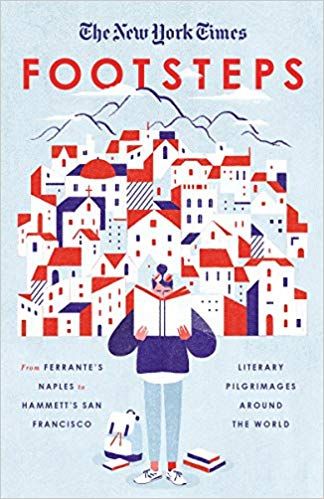 . Seriously, next time you’re taking a trip (or considering where to go), research the authors who lived in that place and visit the diner where they wrote, their grave, the street named after them, their statue. Paying tribute to a great writer is inspiring.
. Seriously, next time you’re taking a trip (or considering where to go), research the authors who lived in that place and visit the diner where they wrote, their grave, the street named after them, their statue. Paying tribute to a great writer is inspiring.
Redesign your bookshelves. Build custom bookshelves. Or buy new bookshelves. Or reorganize your books. I guarantee you’ll end up stopping, revisiting some favorite books, and coming away with joy in your soul.
Do a personal writing retreat. I’ve rented a hotel room at Laguna Beach and Huntington Beach for weekend writing retreats (during the off season, so it’s not mucho dinero). I write for a few hours, go out and enjoy the surf and sun, then go back to writing. Whenever I do it, I feel like I’m living the writing life well.
9. Stop Coveting

Coveting is at the root of almost all writing unhappiness. You’re coveting that famous agent that your writing partner landed. You’re coveting that big book advance your university colleague landed. You’re coveting a publication, a spot in a famous literary magazine, a review in a big newspaper, and spot on the bestseller list, the praise of an editor.
There is no end to the things you can want. And that hunger will eat you up inside and rot your spirit.
The Buddhist way of dealing with coveting is to eliminate desire. So you stop coveting anything, whether good or bad things. I respect this method, and I think there’s a lot of wisdom in it, but since I come from the Christian tradition, I’ll speak into that. The Christian tradition says not to stop desiring, but to switch your desire to better things.
Start wanting smaller things: a good morning at your desk, dutifully typing away. The pleasure of a well-crafted phrase. The admiration of your spouse. The community of your writing friends. The knowledge that you’re writing what you should be writing, and being content with that.
If you can either stop desiring or shift your desire, you’re going to be a much happier writer.
10. Focus on the Work, Not the Result

There’s that famous E.L. Doctorow quote:
“Writing a novel is like driving a car at night. You can only see as far as your headlights, but you can make the whole trip that way.”
That advice is equally true for how to live the writing life. You don’t want to focus on things deep in the distance — fame, money, security, admiration, publication.
You want to focus on what’s right in front of you: the words on the page.
You have control over those words on the page, but you don’t have control over anything else. In fact, you’re only setting yourself up for disappointment if you concentrate on what’s going to happen after you write.
And I’m definitely writing this to myself: For so many years I daydreamed incessantly about what was going to happen after I finished X novel or Y book, but would have been much happier had I been focusing on the road right in front of me, driving the next leg of the journey.
11. Break Yourself Out of Ruts
 I’ve been most unhappy as a writer when I’ve been slugging away at something that’s not working.
I’ve been most unhappy as a writer when I’ve been slugging away at something that’s not working.
Perhaps I’ve been working on a story too long. Perhaps I’ve been working on a book that simply doesn’t work.
But it’s such a pleasure to start writing something else.
- Write a personal essay about a secret you’ve never told anyone.
- Write a blog post.
- Write a letter to your grandmother.
- Write a letter to your mother telling her what you wish you would have told her before she passed.
- Write a dirty limerick.
- Write a pun-filled sonnet.
- Rewrite a famous movie script in the twang and cadence of an Old Western.
- Write fan fiction that puts the characters in outer space.
Boredom = unhappiness.
Solution? Stop being bored. Change up your project.
12. Be Content with What Happens
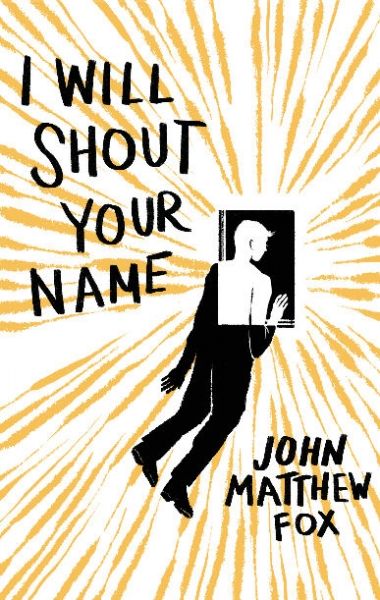 Look, big spoiler alert: my short story collection “I Will Shout Your Name” did not make the New York Times Bestseller list.
Look, big spoiler alert: my short story collection “I Will Shout Your Name” did not make the New York Times Bestseller list.
It didn’t win any big literary awards.
It sold a solid but smallish number of copies.
But I’m still happy about it.
Because I get emails from friends and strangers telling me they really like this or that story, and why. Every day someone out there is connecting with my brain, seeing how I process the world, and that’s an enormous joy and privilege.
I don’t have to be famous. I want to be known. And I’ve been blessed as readers have encountered that book and told me, I see you. I enjoyed that. This made me cry. This made me laugh.
All you can control is your reaction to what the world gives you. And I’m choosing to view it in a positive light, and to treasure the details.
13. Get Around Other Writers
 Make an effort to get around other writers IRL (in real life).
Make an effort to get around other writers IRL (in real life).
I happen to be an extrovert, and so sitting by myself at a computer all day long is not my ideal existence — conferences and writing retreats and community reading and any other chance I have to rub shoulders with the literary crowds gives me shivers of pleasure. I leave with more energy than I arrived with.
And I know this might sound like tortuous advice to the introverts out there (sorry!). For you all, I’d recommend trying to find a more intimate space to interact with another human being — a one-on-one meeting, perhaps.
Ultimately, living life is isolation is not the best route for happiness. Happiness happens in community, whatever community you choose to build as a writer.
All right, Bookfoxers. It’s your turn!
What are your happiness hacks to be a happier writer?
Any and all advice appreciated in the comments.
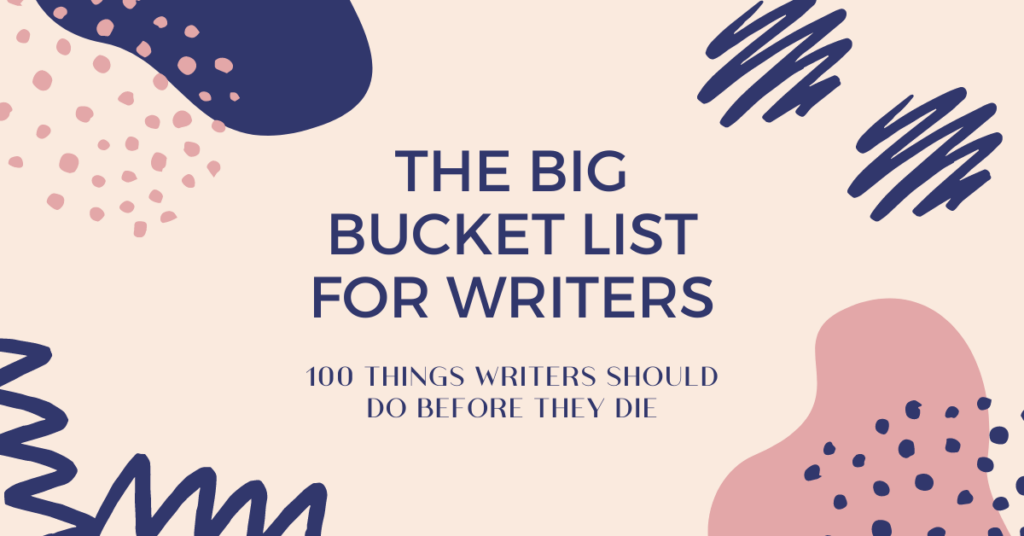

67 comments
I loved Pilgrim at Tinker Creek. And this post! Thanks 🙂
I know, Pilgrim is just wonderful. Can’t believe she was only 28 years old. But don’t think we’ll get any more from her, sadly — nothing in the last decade.
I enjoyed this post so much. Thank you.
Love this post!
This was heartening. I needed it.
This inspired me to get off my tuckus and get myself out of that rut. Thanks for the great post!
Thank you for this!
wow! those tips will definitely help. I haven’t even started applying them but I certainly will. you have given me food for thought this week. Thanks a bunch!
So helpful. I’m going to let myself covet my friends’ ice cream but not their writing success.
lovely post, thanks. I am living the hermit non-stop writing life for now, and I’m loving it, but it needs to come to an end as solitude was not my longtime goal. I love writing and it makes me happy every second because I do it for itself, not to gain something. I will try to reach publication but the worth is there very second I’m having new ideas and turning words into stories. I dream of a writing community….
I loved this!! I’m going to send to our SCBWI group.
When the boy (the boy no less) next door says, “You wrote that book about the girl who comes to New Mexico. I really liked that book!!” I’m overjoyed for a week. It only takes ONE FAN to totally lift your spirits and make all your work worthwhile.
I have a question…I call myself a writer but have yet to produce anything substantial enough for me to really FEEL like a writer. I have multitudinous ideas for books and such yet struggle to begin them. However my question is…how can you tell the difference between writing style and just bad writing? My mother told me I use too many commas and semicolons in my writing, yet its just how it all sounds in my head as I write…Am I writing wrong or is this just my style? Reading this post made me realize how UNHAPPY I am with writing and why…that memory of my mother is the reason why I doubt myself
Hi Michaela,
First of all, you’re a writer if you are writing. Don’t feel like you’re an imposter. Just claim it.
Second, that’s a tough question to answer in the abstract, but I would say the more you read, the better you get at judging what is good writing and what is a counterfeit.
I’m sorry you’re unhappy with your writing, but know that you’re not alone — so many writers are unhappy! My advice is to push the voice of your mother out by putting new voices in there — you should join a writing group that can give you regular feedback.
I haven’t gotten anything published yet. I’m nineteen and have struggled with depression since I was eleven. I’ve hit almost every depression level there is. Recently I’ve been working really hard on just feeling what my brain is telling me to. I think a lot of depressed people try to get outside their brains and ignore their pain. I’ve been practicing using my pain to create art. I’ll write my pain is a story or write some poems or draw my feelings. It really helps get the experience outside of myself instead of trying to hide from it. If I need to get out of my head because it’s dangerous in there I talk to my friends or family about it. Asking people to remind you of your worth is really uncomfortable but very necessary. Also sleeping and eating. I forget to do those things when I’m stuck in a rut.
Thank you so much for sharing this Jannah Rose. It reminds me of me when I was younger and depressed and writing so much and feeling as if I would never publish or be seen/heard. But here you are voicing the need and doing the writing even though it’s hard. I applaud you. <3
Good article. I like the idea of going back to the book that made me want to write. It was Palomino by Danielle Steel. I’m going to drag out my mint condition book club edition. I had 1 bad review out of ten on Amazon (I’m selfpublished) and am still dealing with my devastation. Love your emails. Back to work I go. Thanks.
What a lovely article! I love Annie Dillard and keep her American Childhood nearby. I’d love to write with her precision. Great writing reminds me of the gaps I need to jump but above all, I love the slow, steady progress. Happiness is a habit (there was a book by that title I read long ago; it was my mother’s) and I agree that when you’re unhappy to do something nice for someone else. It pulls one out of self and outward. Even introverts need this. I’ve been having a hard time getting into my picture books. I just released my first novel–BOUND–and my mind won’t switch back. But I am loving all the aspects and seeing the book in readers’ hands and it was such a thrill to discover that someone was talking it up on Instagram with hearts. And it’s not my mother 🙂
This made me smile. I especially liked the part about not coveting, ice cream cone in hand. Since book marketing has become a bit dreary right now, I think I’ll have some fun and work on book 2 in my series. I have found that writing is more fun for me when it’s an escape (as if I must outsmart some unseen villain who wants to tie my hands). The same goes for book marketing. Things like that are more fun when I have to fight for them. I wonder if anyone else can relate.
What a great post, John! You offered so many wonderful suggestions on how to self-and-other give as a writer. For now I’m going to focus on: “Do Some Guerrilla Poetry”, “Focus on the Work, not the Result”, “Be Content with What Happens”. Thank you for your always thoughtful wisdom and kind heart.
Fantastic post. I don’t write for anyone beyond the children who hear /read what I write. I realize the parent may be the one buying the book, and, therefore, my target audience along with the little ones, but I love when kids tell me they liked it. Easy to please, I guess.
You edited my first book and gave me one simple piece of advice to consider. That changed everything! It also made me realize how “stuck”we can get in our own words. I knew I was “not exactly there”when I sent it, but that changed the minute I read your comments.
Letting in another’s opinion can make all the difference. I went from happy to thrilled!! Thanks
Next book headed your way soon!
Hi Halina,
Awesome to hear! Glad I was able to point you in the right direction, and I look forward to the next book!
Thank you. Been stuck here since my Dad died, although I hadn’t realized how unhappy I was until this week. You’ve given me things to think about. I think focusing on the small things will be a place to start.
I appreciate/hear/value what you’ve written here. Thank you.
What a great post. Particularly the first advice which immediately flashed my personal inspirational book in that regard before my mind’s eye: Stephen King’s “On Writing”.
Highly recommended (just on the off chance that some of the peers didn’t read it yet 😉 )
I shall get it out of the cabinet again now to break my block.
Have a great sunday!
So many good suggestions and good insights. For years I worked at blogs and newsletters, desperate to get published. I finally did have pieces published – but no pay. Then I got a gig as a paid columnist. I was happy for a little while. I’ve now written a novel, finally found an agent – I feel that same dissatisfaction and desperation all over again about “will I ever find a publisher for this book???” I disregard all the things that seemed like achievements before, and now feel as if my life will come to an end if I can’t get some fiction work published. As you say, consistent writing is very important — and also, for me, moderate outdoor physical exercise like a walk or bike ride where I can mull things. Thanks for this great post!
I started with post-cancer depression and I was like a bear with a sore head.
I had never written before, but to cheer myself up I started writing comedy.
It worked and I am still writing, though I am now mainly writing plays (I even have an Agent-how cool is that?)
Some good advice here though. Thanks
Thank you so much for this powerful encouragement! I felt understood in my struggles and desires as a writer! 🙂 My personal takeaway: “You want to focus on what’s right in front of you: the words on the page. You have control over those words on the page, but you don’t have control over anything else.”
I agree with so many of the comments made about this post. It was a wonderful post and one that I and obviously many others can relate to. Thanks so much for posting!
I’ve made a document with my encouraging rejections. When I’m particularly disheartened I read it and it makes me feel better. Thanks for this article.
What a great post! I especially love the idea of having a praise session with a fellow writer, because you are right – we get a LOT of critiques! Setting out to purposely honor one another’s work is a GREAT idea.
For me, switching up creative expressions sometimes helps. Sit at the piano or strum a guitar instead of sitting at your desk in front of a computer, write a song, color in a coloring book, go to an art museum, plant an herb garden, gather branches and stems and flowers on a nature walk and trace these on paper when you get home, watch a really artistic band in concert (even if it’s on TV), etc.
I also think Julia Cameron’s “Artist Dates” are a win for artists in all mediums! Actually, I recommend doing the whole book. 🙂
Annie Dillard was my writing teacher in college right after she won the Pulitzer Prize for Pilgrim At Tinker Creek when I began writing fiction. She loved the sound of a Conrad Aiken poem so much, she’d read it in the morning to inspire her to write. We all have our springboards!
Oh, I love this! Lucky you! Will have to read some Conrad Aiken.
I am in the process of publishing my first book but even if it does not hit the market, or even if I get negative feedback, I am so proud about the courage I took to come out of a nutshell reread my book so many times and gave myself a pat on my shoulder. The only thing I need to do now is join a book club. Thank you.
These are wonderful tips! I often go back to War and Peace for inspiration, and it never disappoints me : ) I read once that Peter Mayle used to take long walks in the countryside to get out of a writing rut. Well, I don’t live in Provence, so the view is not quite as beautiful, but there is nothing like fresh air, sunshine, and nature to get my head back in the game. Thank you for the encouragement!
What a wonderful post! Thanks. I love the idea of encouragement sessions…will give that a try with my critique group.
p.s. Pets help too. Nothing like a kitty in your lap to keep you in that chair!
I guess when I’m feeling a bit down about the latest rejection I’ve received, or the realisation that all those fantasies I had about being a big, important writer are just fantasies, I want to know someone else out there is going through the same thing.
You hit the nail on the head about a dozen times for me with this post. Many, many thanks.
Today was one of those days where every word I put on paper read horribly. This article came right when I needed it. Thank you!
I am in the process of writing my memoir of living in Sierra Leone during the civil war in the late 80s to early 90s and your message has inspired me to get started and shared my story thanks for the inspiring.
Sounds like a great premise! Good luck with the memoir and glad this post helped you.
I think the most obvious cause for deep sadness is something you touched on at a few points throughout – the perfectionist streak. I have found that writing a high-level, academic piece really takes it out of me for that reason and so those ‘hard to write’ works can be emotionally draining. I love the, “Throw a party for someone else’s success” idea. Generosity, kindness, Charity, … focusing on contributing to others’ happiness for a moment, before coming back to our own needs is cathartic. It interrupts the downward spiral and gets us thinking in a new light, direction, …
You offered some good advice here!
I don’t think it’s a question of, “love me, love my work”, and I don’t expect that.
Keep in mind our identities in real life, not just in our writers’ “sphere” – – –
Hi Irene, Good point. We have to separate our work from our identities. If someone dislikes our writing, it doesn’t mean they dislike us.
Thank you, I really appreciate the wisdom you share, both here and in your regular newsletters. After many years of almost fruitless (materially) efforts at writing prose, I’m now getting some nice feedback for my poems. I decided to try something different for a while, and it paid off. Doing stuff for other people really really works – I recently started volunteering for a charity by writing and recording poetry – feel very grateful for the feeling that gives me, and I know it flows into other areas of life. Having a one-to-one writing buddy sometimes works for me, especially giving each other deadlines, which is motivating, but that might be because I’m not the hardest worker in the world. Wishing everyone love and luck, and hoping you’re all well and safe.
Hi,
Nice post. Thanks for sharing this with us. According to me happiness is all around us.
Thanks.
Such a beautiful, necessary post for me today. Thanks so much, very grateful.
In terms of how I stay “happy,” which I might rephrase to “content,” I have a few ways.
1. I might be sorely misguided but I hang on to the hope that someone, a lit mag, an editor, has liked my writing before and surely, there is someone ELSE out there who will, too!
2. I’ve been working on a novel for close to four years and am in the polishing phase. I hope that the simple act of actually finishing it will be reward enough.
3. I keep submitting, despite the torrent of rejections. It makes me feel like I’m actually doing something. I gives me hope.
4. I re-read the nice rejection letters. Just this year, I placed in the top 10 of an esteemed journal’s contest, even though they only formally announced three. I go to this one often.
I write early. When it’s still dark. And I write through the sunset, while the sky fills with color and light. This duality, this literal awakening of the day, suffuses your writing with a rich and deep psychology. Not sure why or how, I just know I feel it in my bones and bones-feelings are important feelings.
Seriously, take vitamin D especially in the winter. Writers spend too much time indoors and it makes you go crazy.
ditto exercise- it raises your serotonin levels. Dancing is the easiest way to stimulate serotonin and feel good vibes.
Great post, thank you for sharing! I laughed out loud when you addressed introverts (hi!) but your weekend writing retreats sounds divine! What a great reason for a road trip, a getaway to write and then enjoy nature sounds like total bliss. Hoping you and yours are well and healthy during this pandemic! x
I’ve been writing for many many years. The most important thing is to write–first and foremost–for yourself. Don’t write for an audience. When you write for yourself and forget about who’s going to read it, you find your authentic writing voice. You don’t have to share everything you write, either. You’ll find the more you write from an honest place, the more joy and enjoyment you’ll get from writing.
Thank you for helping lift me. I’ve lost sight of what I want, but this puts me in the mood to look.
This post was wonderful – it started my day off right! Pilgrim at Tinker Creek was one of my early favorites and I wanted then (and still want) to write like Annie Dillard – I worked for the US Forest Service at the time and had just had my own “tree with lights” experience, so I developed a strong trust in her observations about the natural world. I’m going to try the poetry post soon, I’d love to find something like that on my daily walk.
Writing leaves an indelible mark on the world, saying “I was here.” It’s a ‘here’ that nobody has ever been to before, and if anyone else goes there, they’re quoting me!
More than anything, getting into the Zone is delightful. It’s not always or even usually there, but when we hit it, and watch with wonder as marvelous words and incredible ideas and really cool stories come bursting out on the screen in front of my face, so even I’m wondering what’s going to happen, and even I can’t wait for the next sentence, is very cool, and I know that anyone else who reads it is going to feel the same way I feel about it when it comes out of me. I have enhanced the universe a little, and it is more beautiful, and will be forever, because of what I have wrought.
Sometimes you get a little bit of happiness when you least expect it-like during a pandemic, when you’re all alone with your failures and writer’s block and you find yourself talking philosophically to your dog. Then along comes a post like this, and you find you’re NOT actually alone. I’ve done some of the exercises, and although I STILL want to steal everything John Irving has ever written, I’ve found that re-reading some of my favorites of his work helps. YOU help, too, John Fox. Thanks for the surprise happy. I’m going to go talk to my dog about it now. 😉
1.) Take a break: seeing new scenery sometimes helps unlock a passage I’m trying to get through.
2.) Normalize mental health days and understand that we can’t reset ourselves on just Saturday and Sunday.
3.) Keep track of productive time: I find its easier to find breaks when I know how productive I’ve been. Yesterday was a complete mental block and part of me wanted to just push through. But I looked at my productivity timer and realized I had worked on projects 10 hours the day before and most days over 8 for the past week. So my brain probably really did need a day for some fresh air.
OMG, I needed this. Thank you, thank you.
Thanks for the joy reminder! Honestly, that’s the hardest part. I love the idea of a personal writing retreat and taking extra special care of where your books live. Reconnecting with that joy keeps the battery running!
What an extraordinarily giving soul you are..thank you..deeply.
So much of what you say, what you wrote, seems like pure common sense. But put out there in black and white made it leap out loud.
Personally I find walking my dog before I write a great way to stay tuned to the way my mind wanders. I find a flower. A bee. A fledgling bird struggling with the flight of the wind, and I find a sentence. Then I carry them home. I don’t always recall them all. But the ones I do, oh my. That is joy, words becoming alive on the page before me.
Please stay safe and well dear man. And thank you for this incredible encouragement.
It made me feel calmer, less stressed about writing, and more connected just reading that.
This was wonderful! Thank you! I am saving it for a rainy day when I am in need.
There are a few things I will do when the blues come creeping in…
1. watch a funny show
2. read a funny book
3. take a drive thru beautiful scenery and listen to a funny audio-book.
4. (this should be #1 but sometimes it comes later than it should…) pray and ask God to give me some form of encouragement about writing, because I am not published yet and question at times if I am actually supposed to be continuing with writing. He answers this for me in surprising ways and then I am high on a cloud afterward. It is beautiful.
5. Writing gives me so much joy most of the time, that not doing it is depressing in itself. I write early in the morning before work, sitting in my car in a beautiful spot near my office. I shoot for 1.5 hrs but even if it is only for 15 minutes, it is worth it.
You got me really covered. Thank you sir for being at our level of starters. I have saved the post.
Thank you so much for this post! You are an excellent writer, able to make readers feel what you are feeling. I have never published anything yet, but also haven’t been writing for quite some time. I’ve just been existing it feels like. However, as of this week I have recently lost 65 lbs. and have been walking fifty miles per month. Now I am going to add one hour of writing directly after the morning walk. Again, thank you. This was a great nudge in the right direction.
Love this very much. I needed it. Especially the coveting bit. I have too many unnecessary desires at the moment and can’t truly focus on one.
With all the books I’ve read and videos, I’ve watched, you are a wealth of information and inspiration over them all! I write heartfelt, published greeting cards. When I’ve been up against a wall with a story that’s just not making it, and I don’t even know how to fix it, I turn to my cards/prose It always helps me refocus. My family and friends are naysayers and can’t understand how writing in another genre, unlocks the beast (lol) in me, and I’m ready to write children’s books again with joy.
John, you have been an immense inspiration to me via the few Bookfox courses I’ve undertaken so far, and still continuing. Your insightful regular emails on writing tips are precious, and your down-to-earth, honest approach in your course videos is very endearing. Being a quiet introvert, unlike you, I often used to come away from writing festivals feeling highly intimidated by ‘better’ writers (in my view), rather than uplifted or inspired, which would cause me to stop writing for long periods of time. I now have a couple of online writing buddies I exchange writing pieces with for feedback, and engage in other online writing pursuits. During my slumps, I also refer back to a writing journal I started keeping years ago where I continually add quotes from various writers about their writing struggles or their writing tips, from Ernest Hemingway to John Matthew Fox. Any writer that uplifts my spirits and provides inspiration during my low periods, is worthy of belonging in my writing journal that has the aptly printed quote on the cover, ‘Let Life Surprise You’. I have found my inner writing path by navigating around those things that didn’t work for me, to those that made me feel at peace within. That all comes with trial and error, and not beating up on yourself too much. Hang in there, fellow writers.
Hi Jayne, What a nice note! So glad you’ve enjoyed the courses and glad I could inspired you.
Great decision to keep that writing journal as well. It’s a great way to keep the spirits up.
I will try my best to do it I hope I can get it
and can be a famous girl